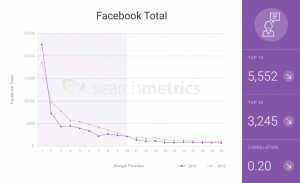
For advertisers and brands, search engine marketing (SEM) and search engine optimization (SEO) have been the tried and true methods of reaching customers on the internet.
However, the constantly rising popularity of social media is forcing advertisers to sit down and think, “Am I really using the best strategy for my brands now?”
So, now the real question is: What strategy is best in a marketing campaign? The first step is to break down how each one works.
Search Engine Optimization
SEO is the process of optimizing a site’s content in order to rank at or near the top of a list of organic search engine results.

Optimizing your primary website for organic search results can be done through keyword and tag selection, a fast page load speed, social sharing integration, high quality content, and natural backlinks.
The ultimate goal with SEO is to naturally outrank the competition on a search engine results page (SERP) without using paid advertising and bidded keywords.
Search Engine Marketing
Search engine marketing differs from SEO in the way that, while it involves optimizing for organic search results, it also uses paid advertising.
SEM is internet marketing that includes the promotion of websites with paid advertising in the form of pay per click or pay per call ads.

Along with organic search optimization, SEM involves targeted, sponsored listings or ads that appear at the top and sometimes the side of a SERP. With SEM, there’s also the option of retargeting customers who previously searched for you through the display ad network.
Social Media
An active social media presence can help to expand your brand or company’s reach, build customer relationships, and establish trust on the web by using unique and creative ads or content to stand out from the competition.
Now, a lot of social media sites, especially more content-rich ones like Facebook or LinkedIn, are being used similarly to search engines. People are turning to social media for news updates, reviews, and informative content.
Optimizing a social media profile involves fully developing your profiles on social networks for your business so that there’s plenty of creative, shareable content that members of your network can view and engage with.
There’s a growing overlap between social and search. It’s important to optimize your profiles because social shares are becoming increasingly important in calculating organic ranks on a SERP.
Social Media Marketing (SMM)
Social media marketing is simply the paid or sponsored posts that you see while scrolling through a social media site. They typically blend in with the environment of the website and analyze the data from users’ profiles in order to place highly targeted and relevant ads. The cost per click of SMM is also generally lower than search advertising.

Another benefit of social? Users love to share and interact. This means that there’s a greater chance for social media users to share your brand’s content at no additional cost to you.
So, Which Should You Use?
This is where it gets tricky. The answer is that there’s no one singular solution. As frustrating as that sounds, it really does depend on your brand, service, product, or business, and it involves a lot of testing.
However, the importance of social media is undeniable now that a solid presence on social media can help organic search rankings. But also, social media profiles can help drive traffic to a company’s primary website.
Organic optimization and paid advertising can ultimately help each other out. The tricky part is where you should start. Think about your company’s services or products and the type of customer you attract. Then, ask yourself these questions:
What Are My Goals and How Can I Achieve Them?
Social is best for building brand awareness, showcasing your product, or retargeting customers and engaging with them. Social is all about generating discussion and sharing content that users find enjoyable, which can help you achieve these more efficiently.
Search is great for informing customers of a service, describing a product, or targeting customers who have an immediate need and are actively searching for what you offer.
Figuring out the goals of your campaign will help you decide how you want to achieve them, whether it be through social or search and paid advertising or optimization.
What Makes My Customers Decide to Buy?
Are your shoppers impulsive and buy what they see? Or do they do their research before making a purchase or employing your service?
Think of it this way: if a customer is looking up a tow truck, chances are, there’s an immediate need for one. People don’t employ the services of a tow truck unless their car isn’t working. So those customers are probably searching and can be reached with SEM or SEO.
But a clothing store? People usually see and then decide to buy, unless it’s something more essential, like jeans or sneakers.
Does My Company Have a Strong Brand Awareness?
If consumers don’t know you, then they won’t know to search for you. Here, it would be beneficial to pay for social advertising to target customers who may be interested in your brand and get your name out there.
But, you should also focus on optimizing your website and social media profiles in order to increase your chances of also being seen organically and shared with others.
What’s My Budget?
A large ad spend budget can allow you to bid on common keywords in SEM, but a small budget doesn’t have to limit you.
Social media advertising is generally less expensive than search advertising, but you can also bid on more specific, long-tail keywords in SEM that’ll ultimately bring you more qualified leads.
Do I Want to Show or Describe My Product/Service?
In some cases, it’s better to show what you’re offering, and in other cases, it’s best to describe.
While you can have display ads shown across millions of sites on a display network, it’s usually better for branding. Instead, showcase your product on social media through an organic post on your profile or a paid ad for a better chance at targeting a converting customer.
Customize Your Strategy for Your Company
No matter what, when you’re choosing your marketing and advertising strategy, it’s important to keep in mind the ultimate goals of your campaign, whether it be to build brand awareness, drive website visitors, increase sales, etc. Ultimately, it’s best to choose a mixture of the three.
Sometimes, search beats social. Other times, social beats search. It all depends on your brand, product, and demographic of customers.

(28)








